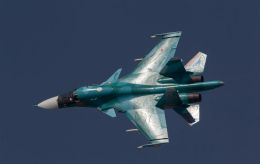Kim offended? Why North Korea threatening South Korea again and is there risk of large-scale war
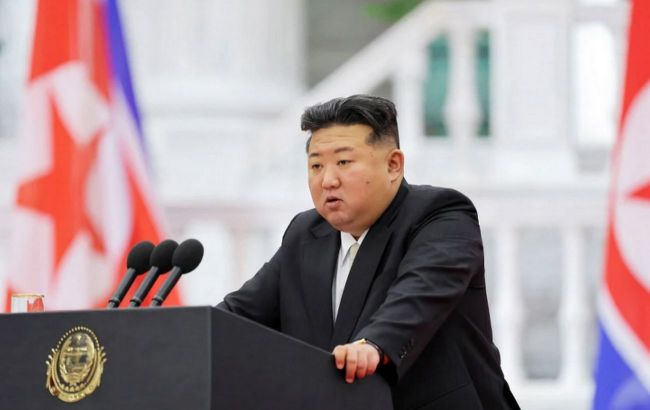 Photo: North Korean leader Kim Jong Un may have been offended by South Korean leaflets (kcna.kp)
Photo: North Korean leader Kim Jong Un may have been offended by South Korean leaflets (kcna.kp)
In recent days, tensions on the Korean Peninsula have sharply increased. In response to leaflets criticizing Kim Jong Un, North Korea has put its troops on alert and may be considering the possibility of blowing up roads connecting it with South Korea.
For more on the reasons behind the escalation, North Korea's fiery rhetoric, and the risks of armed conflict, see the material from RBC-Ukraine.
Contents
- Leaflets with 'slander' and threats exchanged
- How North and South "fight" with balloons
- North Korea on combat alert and may blow up roads
- What has caused North Korea's harsh rhetoric
- Is there a risk of a large-scale armed conflict
- Escalation as a way to influence US elections
Leaflets with 'slander' and threats exchanged
Last Friday, North Korea accused South Korea of sending propaganda leaflets via drones. According to reports, these drones have been spotted three times since the beginning of October in the area around Pyongyang.
North Korean state news agency KCNA stated that the leaflets contained "incendiary rumors and nonsense." The North Korean Ministry of Foreign Affairs clarified that they included political propaganda and slander against leader Kim Jong Un.
Pyongyang officially condemned this as a violation of "sacred sovereignty," a threat to security, and a serious provocation that could lead to armed conflict. Additionally, North Korea announced the preparation of all means of attack.
"The criminals should no longer gamble with the lives of their citizens," the statement from the Ministry of Foreign Affairs addressed to Seoul said.
It remains unclear who launched the drones with the leaflets. No activist group in South Korea, which is hostile toward the North, has claimed responsibility. Initially, the Ministry of Defense denied Pyongyang's version, but later the Joint Chiefs of Staff noted that they could not confirm whether Pyongyang's accusations were true or not.
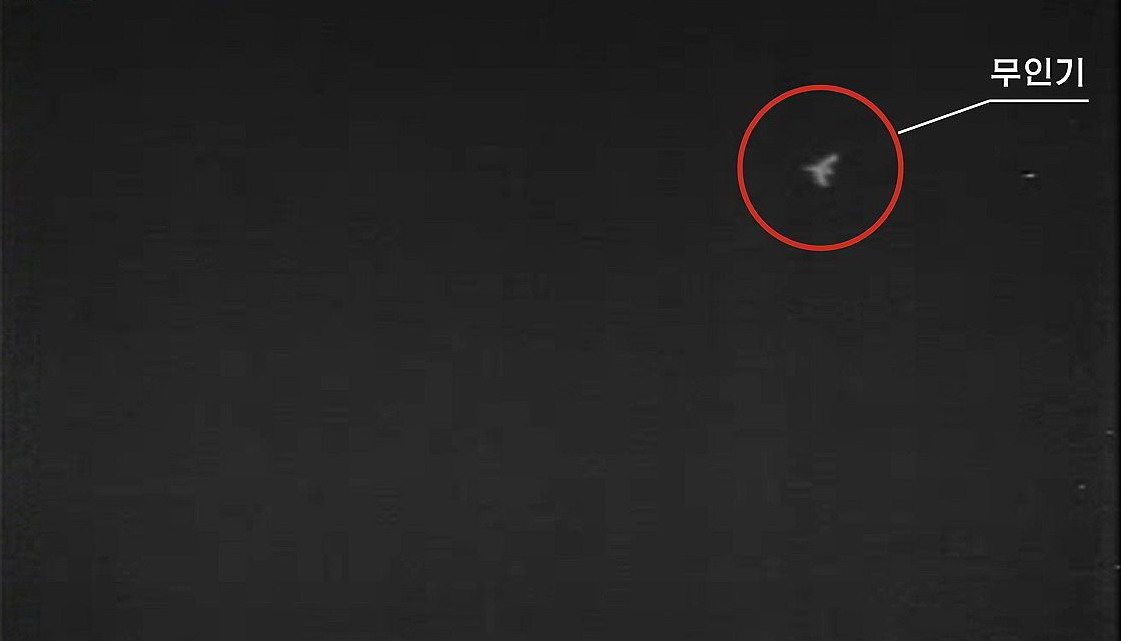
Photo: likely image of a drone over Pyongyang (kcna.kp)
It should be noted that the only likely image of one of the drones was shown by North Korean state TV. The footage shows a white-winged object against the dark sky. The type of drone is not specified.
Meanwhile, South Korea advised opponents not to act recklessly.
"We will retaliate resolutely and mercilessly if the North endangers the safety of our people," said a statement from the South.
How North and South "fight" with balloons
This incident marked the first time North Korea directly accused its neighbor of using drones to drop leaflets criticizing Kim Jong Un.
Previously, activist groups in the South, some of which are led by defectors from North Korea, used balloons for such purposes. They would send USB flash drives with South Korean movies, popular K-pop music, and leaflets calling Kim a "pig."
This prompted a response from the North, which in recent months launched thousands of balloons filled with paper and other waste materials.
Regarding drones, in recent years South Korea has repeatedly accused North Korea of violating its airspace. For example, in December 2022, planes were scrambled after five North Korean drones were spotted over the Greater Seoul area. The military fired several shots but failed to shoot down any of the targets.
The event prompted President Yoon Suk-yeol to expedite the development of spy drones to monitor North Korea’s military sites. Kim Jong Un also showed personal interest in drone development, promising to oversee the production of advanced UAVs with greater flight range.
North Korea on combat alert and may blow up roads
The latest statements about drones have sparked heated disputes between North and South Korea. While not uncommon, this recent scandal reflects a sharp deterioration in inter-Korean relations.
North Korea says its advanced army units near the demilitarized zone are ready to strike targets in the South without warning. Since Sunday evening, eight artillery brigades, armed in accordance with wartime strength and positioning, have been put on full combat alert.
Additionally, North Korea's General Staff has instructed units at all levels to prepare countermeasures in case drones cross the border again.
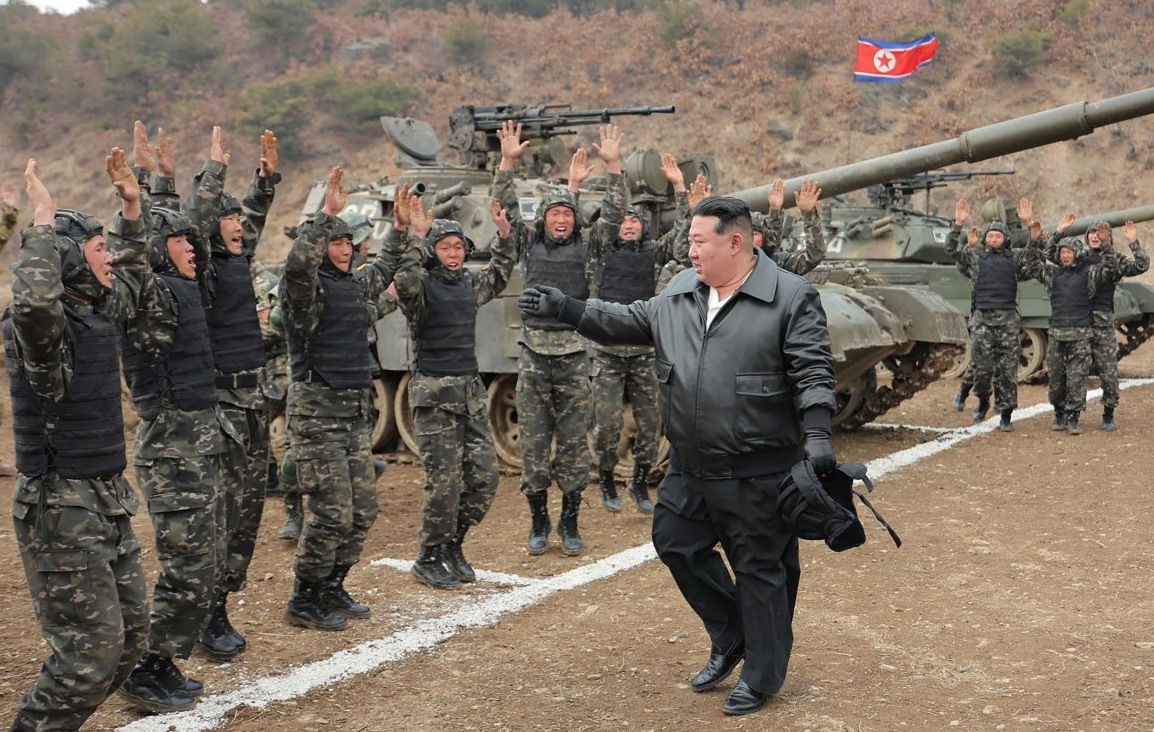
Photo: North Korean troops near the demilitarized zone have been put on full combat readiness (illustrative photo, kcna.kp)
This order came after Kim Jong Un's influential sister, Kim Yo Jong, called the South Korean Ministry of Defense's warning of an unrelenting response "suicidal."
"That time is not set by us. The moment that a drone is discovered in the sky over our capital city once again will certainly lead to a horrible disaster," she stated.
Her words were seen in Seoul as "hypocritical behavior that continues provocations."
"We clearly warn that if North Korea inflicts harm on the safety of our people, that day will be the end of the North Korean regime," added South Korea's Ministry of Defense.
Today, a spokesperson for the Joint Chiefs of Staff, Lee Sung-jun, said that North Korea is preparing to blow up its section of the roads connecting it to South Korea. According to him, explosions could happen as early as October 14.
If this happens, the destruction of roads will be yet another instance of Pyongyang destroying symbols of rapprochement with Seoul. In 2020, North Korea blew up the inter-Korean liaison office, which was likely an attempt to draw the world's attention to the risks of a new war.
What has caused North Korea's harsh rhetoric
The intense rhetoric from Pyongyang is largely driven by the legitimacy of the North Korean regime, which is heavily reliant on maintaining a strictly positive image of the Kim dynasty. The Kim family has ruled the country since its founding in 1948, and the regime is extremely sensitive to any external challenge to the cult of personality surrounding Kim Jong Un, and previously, his father Kim Jong Il, and grandfather Kim Il-sung.
According to Volodymyr Fesenko, Chairman of the Board of the Penta Center for Applied Political Studies, South Korea was considering how to respond to the "war of petty annoyances" involving trash dumping and decided to use a propagandistic approach.
"It’s a strong move. You have to understand that when we talk about North Korea, we’re talking about a totalitarian state. Not just a cult of personality, but a deification of Kim. So the leaflets were perceived as a personal insult," he told RBC-Ukraine.
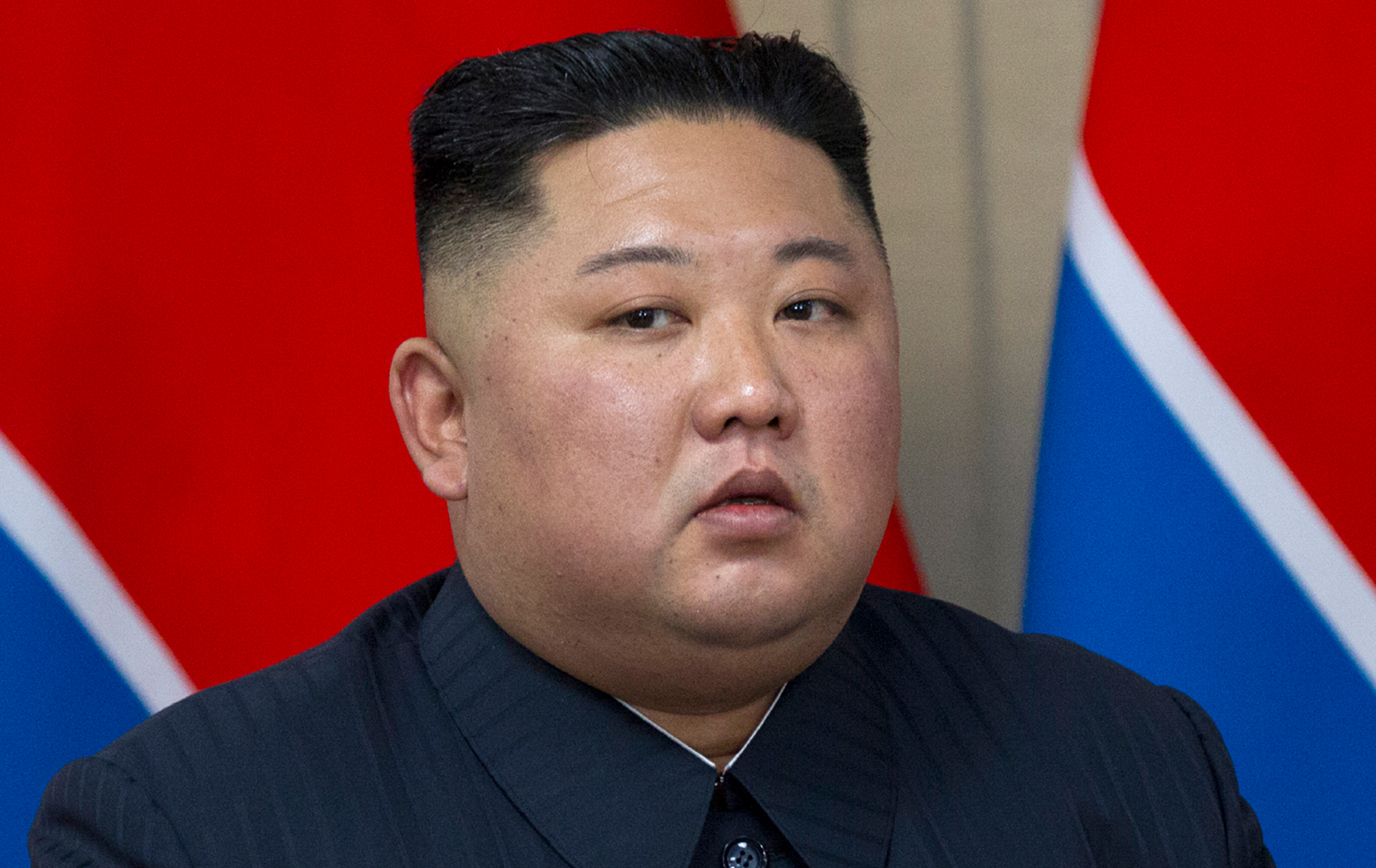
Photo: harsh rhetoric linked to Kim Jong Un's offense and desire to demonstrate power (Getty Images)
In principle, cross-border shelling has occurred before, though rarely. But now, the level of tension has increased, and in addition to responding to the insult of their leader, North Korea is staging a display of strength.
"They want to show that times have changed, that they are not afraid to fight. Now, with Russia behind them, they have become stronger and must be feared. That they will respond with fire even to insults," added the political scientist.
Is there a risk of a large-scale armed conflict
What is currently happening on the Korean Peninsula has been unfolding for decades. Moreover, the leaflet provocation against Kim Jong Un was not the most significant in a long time, explains the expert of the Council on Foreign Policy Ukrainian Prism, Oleksandr Kraiev.
"Since 2022, North Korea has constantly been testing the limits of what is allowed. It's not about actually starting a full-scale conflict or war. North Korea is trying to understand at what point the West will respond. Also, it is crucial to know at what point China will react. We see that Kim's regime is now taking a course toward some confrontation with China. They want to break into more independent economic waters. And it turns out that North Korea now needs to understand who will do what and when regarding their provocations," he told the RBC-Ukraine YouTube channel.
If there were real risks of armed conflict, the media would already be writing about a much larger concentration of troops and firepower near the demilitarized zone, agrees Fesenko.
In his opinion, there is no such threat right now. At most, North Korea might resort to shelling border areas.
"I think Russia doesn't want war. They want North Korea to help them, not to fight with the South. Especially since this could lead to a deterioration in relations with South Korea, and the Russians don’t want to burn all bridges with this country. And China doesn't want war either. I think they will restrain North Korea, and this won't lead to any large-scale military conflict," the interlocutor added.
Escalation as a way to influence US elections
Since the failure of diplomacy between Kim Jong Un and former US President Donald Trump in 2019, North Korea has resorted to increasingly hostile rhetoric. At that time, there were hopes that the leaders would agree to roll back North Korea’s nuclear program in exchange for easing international sanctions.
However, after the collapse of negotiations, Kim Jong Un intensified nuclear and missile tests, and South Korea strengthened ties with the United States and Japan. Last month, images from a uranium enrichment facility for atomic bombs surfaced, and Seoul officials warned that North Korea might conduct nuclear tests closer to the US presidential elections.
Therefore, Western observers believe that North Korea is once again trying to demonstrate to candidates — Trump and Kamala Harris — its ability to stir instability on the Korean Peninsula.
Volodymyr Fesenko finds this theory interesting and points out that as early as summer, there were speculations that the Russians might “set a trap” for Joe Biden and indirectly for Harris.
"They are not interested in a large-scale war but would like to provoke a symbolic conflict on the Korean border. To show the weakness of the Democrats. To give Trump an argument, saying that if he were president, there wouldn't be a war, but under Biden, 'one war follows another.' I don't rule out such a scenario. A symbolic conflict is possible to influence the US elections. But it would be a conflict that doesn't turn into something that North Korea's allies don't need," the political scientist noted.
Sources: materials from KCNA (North Korean state news agency), South Korean outlet Yonhap, Bloomberg, and The Guardian, as well as comments from Volodymyr Fesenko, Chairman of the Board of the Penta Center for Applied Political Studies, and Oleksandr Kraiev, an expert at the Council on Foreign Policy Ukrainian Prism.

